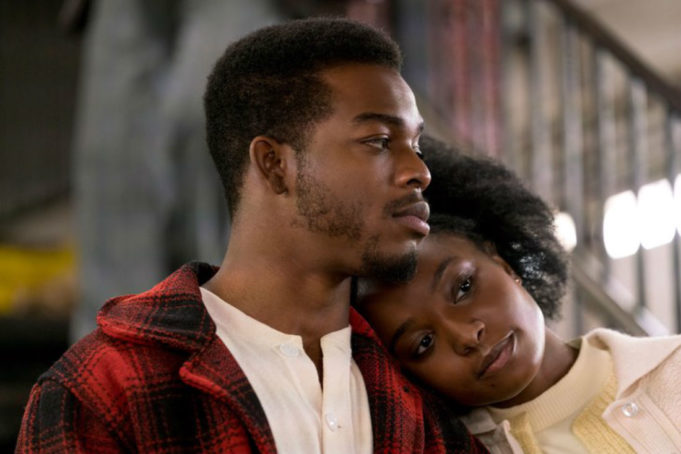The movies have mostly neglected James Baldwin, but the 20th-century novelist and essayist foresaw everything that’s happening in Trump’s America, so it’s good that they’re coming to him now. Even better, there’s now a filmmaker who’s equal to the task of bringing his literary works to the big screen. Barry Jenkins is multifariously gifted, capable of translating both Baldwin’s righteous anger and his rapturous poetry to cinema, and since the first great cinematic achievement of 2018 was Black Panther, it seems only right that that’s bookended by If Beale Street Could Talk, a masterpiece suffused with African-American pride that is currently playing at AMC Parks and expands to other local theaters this weekend.
Based on Baldwin’s novel, the film is about Tish Rivers (KiKi Layne), a 19-year-old growing up in Harlem in the early 1970s. She and Alonzo “Fonny” Hunt (Stephan James) have known each other since they were little, and now she’s going to have his baby. Alas, she has to break the news to him in prison, where he’s locked up on a rape charge manufactured by a cop with a grudge (a wormy-looking Ed Skrein). Even with the baby’s two grandfathers (Colman Domingo and Michael Beach) working illegally to pay for a hard-working lawyer (Finn Wittrock) who smells the stench off the accusation, it’s still a near-impossible task to extricate Fonny in time for him to see his child.
We associate Jenkins with romance and lyricism because of Moonlight. Indeed, he seems to be better at those things than any other filmmaker right now. (His only competition is Damien Chazelle, the director whose name is inextricably linked with Jenkins’ through no fault of either of theirs.) Cinematographer James Laxton photographs this romance in gorgeous hues and lovingly caresses the angles on his actors’ faces, while composer Nicholas Britell contributes a fantastic score, full of sonorous strings without jarring with the vintage R&B and soul that dots the soundtrack, and blaring in a Bernard Herrmann fashion when the occasion calls for it. The one area where Jenkins stumbles is including too much of Tish’s voiceover narration. It’s disconcerting to see such a magnificent filmmaker make such a basic mistake, but then again, it’s hard to blame him for falling under the spell of Baldwin’s words.
For all the beauty on display here, Jenkins does not neglect the harsher truths underlying this story, and he stages a spectacularly ugly scene early on when Tish tells Fonny’s family about her pregnancy. (His mother and sisters are the type of African-Americans who use the n-word the same way white people do, and they call Tish’s family that and a whole bunch of other things.) Then there’s a comparably disturbing encounter when Tish’s mother (Regina King) tracks down the rape victim (Emily Rios) in Puerto Rico and finds that just because Fonny is wrongly accused, doesn’t mean that there wasn’t a rape. Over the course of the film, Tish has four conversations with Fonny in prison, and cumulatively, they form a horrifying depiction of a gentle soul being brutalized and worn down on the inside.
A large part of that is James’ understated but shattering performance, which is a barometer of Jenkins’ ability to direct actors. Brian Tyree Henry (who’s having himself a year, having already stood out in both Widows and Spider-Man: Into the Spider-Verse) shows up as an ex-convict friend of Fonny’s, and you won’t soon forget the haunted look that comes into this fun-loving man’s eyes when he says, “In there, they can do with you whatever they want.” Teyonah Parris brings serious heat as Tish’s fiercely protective older sister, and the newcomer Layne is marvelous as a girl whose uncomplicated love for her man doesn’t prevent her from grasping the cruelty of the white man’s world she lives in.
Maybe best of all is King as a woman who moves heaven and earth — and also dons a Rita Moreno wig in Puerto Rico, at no little cost to her pride — to prove Fonny’s innocence. The part doesn’t offer up much in the way of fireworks, but the veteran King wields quiet, calming authority like the most comforting of shields in the midst of a bad situation. Yet she maintains her firm resolve in the face of a fearsome Puerto Rican mob boss (Pedro Pascal) who’s trying to keep her from further traumatizing the rape victim. After rising to prominence in the 1990s, this actress could not break through the limited opportunities that Hollywood offered African-American women. This movie gives her the showcase she always deserved, and she responds with a performance of heroic dimensions.
If all that’s not enough, Jenkins brings a judicious flashback structure to the story, as events while Fonny is in prison recall to Tish’s mind things that happened when she fell in love with him. The film’s 119-minute running time isn’t the tightest, but the looseness yields incidental gems like Tish observing how men interact with her at her job selling perfume in a nice department store. Jenkins, being a romantic, offers us the love between Tish and Fonny as their salvation. I don’t think he’s wrong, but I would point out that taking to the streets to demand justice is a good deal more expedient than falling in love. His art is fundamentally respectable, so much so that I might hold it against him if he weren’t so good at it. (On the other hand, Green Book is also respectable, and I am damn sure holding that against it.) In a late scene, the couple has just found a landlord willing to rent them a place of their own, and as they walk out into the street, Jenkins’ camera whirls around Fonny as he lets out a whoop of joy. That’s the sort of moment that the full-hearted, masterful If Beale Street Could Talk offers us.
If Beale Street Could Talk
Starring KiKi Layne, Stephan James, and Regina King. Written and directed by Barry Jenkins, based on James Baldwin’s novel. Rated R.












